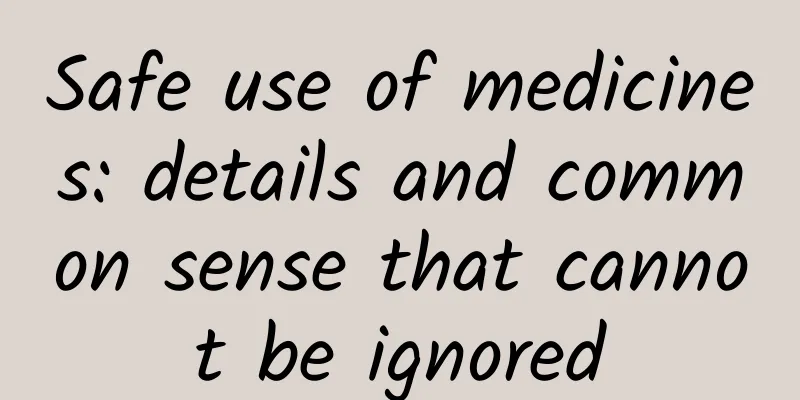The first "myopia eye drops" in China has been approved for marketing. Is it really a miracle drug for myopia?

|
"Atropine is a miracle drug for myopia. It can be used to control, prevent and even treat children's myopia." Atropine sulfate eye drops have been approved for marketing. Many people, especially parents, are very happy about this, because it is rumored that atropine eye drops can have miraculous effects on children's myopia. Rumor Analysis This statement is not rigorous. Atropine can only be used to delay the progression of myopia, but cannot prevent it, let alone treat it. There are many limitations and precautions in its use, and there are risks involved. It is not recommended to use it on your own. Have you heard about this eye drop that can save children from myopia? Have you seen parents around you using it on their children? Now, it has finally been approved! (But don’t get excited, please read the article first) Source: State Drug Administration This is the first atropine sulfate eye drops in China to obtain the "National Medicine Approval Number". Parents with myopic children at home must be familiar with low-concentration atropine, and have heard of Shenyang Xingqi. Before this, Shenyang Xingqi Eye Hospital could prescribe atropine eye drops, but it was just an "in-hospital preparation." What does in-hospital preparation mean? It means that you have to take your child to a local hospital, receive a diagnosis and evaluation from the hospital's doctors, and then take the prescription to the window to get the medicine. This medicine is prepared by the hospital itself and cannot be bought anywhere else. Not only Xingqi Eye Hospital, but also Shandong Eye Hospital, Hebei Eye Hospital, Shanghai Fudan University Affiliated Eye, Ear, Nose and Throat Hospital and other medical institutions have this service. There was a period of time before when patients could buy atropine eye drops through Internet hospital platforms, but considering that putting prescription drugs for in-hospital use only on sale online poses a safety risk of improper use of prescription drugs beyond the scope of use , "online purchase of atropine eye drops" was stopped in 2022. Now that atropine sulfate eye drops have been approved for marketing, it is definitely good news for parents of children in need. It will be more convenient to buy the medicine in the future. As a pediatrician, I would like to remind everyone not to treat eye drops as medicines, and not to use them casually just because they are easy to buy. Prescription drugs have corresponding indications and contraindications, and eye drops also have side effects and adverse reactions. You must follow the doctor's instructions after the ophthalmologist diagnoses and prescribes the medicine. Do not purchase and use them on your own. All risks of unauthorized use will be borne by the child himself! Atropine eye drops Can myopia really be delayed? Atropine eye drops can paralyze the ciliary muscles and dilate the pupils, and were first commonly used in ophthalmic mydriasis refraction. As for why atropine eye drops can treat myopia, it is currently believed that atropine, as a non-selective muscarinic receptor antagonist, most likely works by blocking the expression of muscarinic receptors in retinal and scleral fibroblasts (however, there is currently a lack of more conclusive evidence as to whether receptor blockage directly interferes with axial elongation). Some animal experiments have shown that atropine may delay the progression of myopia by preventing axial elongation of the eye by producing nitric oxide or stimulating the release of dopamine in the retina. It doesn’t matter if you don’t understand the principle. As parents, what we need to know is that the function of atropine eye drops is to delay the progression of myopia in children and control the degree of myopia from increasing so quickly. It is not as magical as many parents think: "After using the drops for a period of time, the child will no longer be myopic." Given that atropine eye drops have been hyped up as a "miracle drug for children's myopia" on the internet, and that some parents even give atropine eye drops to their non-myopic children to prevent myopia (this is strongly not recommended!), we would like to remind everyone to be rational about this. Atropine eye drops should be used according to doctor's advice According to the official announcement, the atropine sulfate eye drops approved this time are suitable for delaying the progression of myopia in children aged 6 to 12 years old with a spherical diopter of -1.00D to -4.00D (astigmatism ≤1.50D, anisometropia ≤1.50D). A search on the National Drug Clinical Trial Registration and Information Disclosure Platform found three clinical trials registered and conducted by Xingqi Eye Medicine for atropine eye drops. According to the official test results, a one-year observation of medication use and a six-month follow-up observation after discontinuation of medication for 406 children aged 6 to 12 years showed that atropine sulfate eye drops were more effective than placebo in terms of the main efficacy indicators, and had good safety and good patient compliance. Since the official did not release more detailed data, we do not know how effective and safe it is. There have been many studies on atropine eye drops at home and abroad. For example, a prospective study published in the journal Nature in 2021 showed that 0.01% atropine eye drops are an effective way to slow the progression of myopia in children. After one year of treatment, the relative reduction rate of myopia progression in the sample was 56%, and most of the observed side effects were mild, such as mild eye discomfort and mild photophobia. It is generally believed that low-concentration atropine (such as 0.01%) is better than or equivalent to high-concentration atropine in slowing the progression of myopia, and relatively fewer side effects are observed. However, the optimal concentration of atropine eye drops has yet to be confirmed . Whether the child's current myopia condition is suitable for atropine drops, what concentration should be used, how long should be used, and how long should be between eye examinations to observe changes in accommodation function are all things that need to be determined by the doctor and cannot be decided at will by the parents. In addition, even low concentrations of atropine have adverse reactions, such as photophobia, eye acid (conjunctival irritation), etc. Atropine eye drops are not suitable for children with high intraocular pressure, fundus lesions, and allergies to ingredients. Secondly, studies have also reported cases of myopia rebound and poor medication effect after stopping the medication . In short, atropine eye drops are not suitable for every myopic child, nor are they effective for every child. For children who are already using atropine eye drops as prescribed by their doctor, we do not recommend relying solely on eye drops to control myopia . The effect of a single method is far inferior to comprehensive prevention and control. How to prevent and control myopia in children, we need to pay attention to the following points: 1. Ensure sufficient outdoor activities every day; 2. Follow the "20-20-20" rule when using your eyes to avoid eye fatigue. That is, every 20 minutes, look at an object 20 feet (about 6 meters) away for 20 seconds; 3. Cultivate healthy eye habits for children. Avoid looking at electronic screens at close range for a long time, avoid reading while lying or lying on your stomach, and avoid reading in an environment with insufficient light; 4. Cultivate children's hygienic habits. Do not rub eyes with dirty hands, keep eyes clean, and avoid eye infections; 5. Take your child to check eyesight regularly to detect problems in time. Looking in the mirror of rumors When it comes to the “big news” about medications, it’s easy to make the right choice if you remember two things. First, if a medication sounds too good to be true, it probably isn’t… Second, always ask a professional or check for yourself: what are the side effects? References [1]https://pubmed.ncbi.nlm.nih.gov/28494063/ Planning and production Source: Dr. Ou Xi (ID: drouxi) Reviewer: Tang Qin, Director and Researcher of the Science Popularization Department of the Chinese Medical Association Editor: Ding Zong |
>>: Are black takeaway spoons poisonous? Do you still dare to use them?
Recommend
Pregnant woman smelled mothballs for five months
We women are very concerned about our own image. ...
Do I need to take off my underwear for a chest X-ray?
Because women's bodies are special, they may ...
What to do if your uterus is sensitive and has contractions
In the middle and late stages of pregnancy, uteri...
What exactly is hypoglycemia?
There was a news report that a woman fainted due ...
Can I eat grapes when my period comes?
It is good for women's skin to eat more fruit...
What should you do if you have the terminal disease of "dry eyes" like Gao Qiqiang in "The Storm"? Chinese medicine experts tell you
Recently, the anti-gangster drama "Kuang Bia...
How to prevent pregnancy if you can't use an IUD
If female friends do not use IUD as a contracepti...
Nutritional menu for pregnancy that helps you grow a baby without gaining weight
After a woman becomes pregnant, she will become e...
What are the methods of beauty and nourishing soup
For us women, spring is the best season for detox...
Will the hymen break on its own?
The hymen appears, grows, and forms when the fetu...
A polyp has grown on the cervix
There are many women with uterine diseases in lif...
What to do if your period is prolonged after having an IUD inserted
To put it simply, an IUD is a procedure in which ...
Can I drink Qi and blood tonic during menstruation?
Can women replenish qi and blood during menstruat...
Fat in Children's Diets: Friend or Foe?
This is the 5176th article of Da Yi Xiao Hu With ...
Antenatal blood biochemical screening
What is the role of prenatal blood routine screen...









